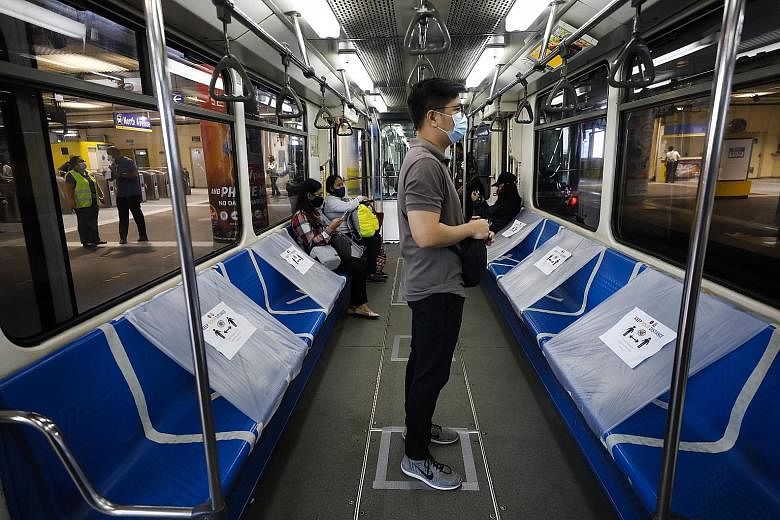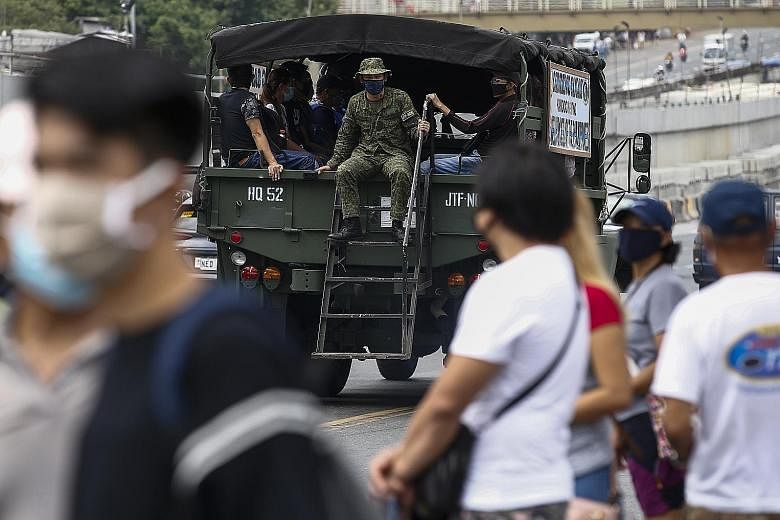Millions of Filipinos living in Metro Manila opted to stay home yesterday, the first day of freedom after the Philippines lifted one of the world's strictest and longest lockdowns over the coronavirus.
Concerns over getting infected by the coronavirus overpowered people's desire to venture out after being cooped up at home for three months.
Many companies have also advised their employees to continue working from home.
"We'd rather wait for how things on the ground will shape up in the next two to four weeks," Mr Jeff Sacramento, country head of tech outsourcing firm Simplus Philippines, told The Straits Times.
Globe Telecom, one of the country's biggest telcos, advised the non-essential employees at its head office to continue working from home till June 15, according to one staff member.
The government has allowed trains, buses, taxis, ride-sharing services and motorised rickshaws to resume services, but it has also curtailed their numbers and limited their passenger load to just half their capacity.
Commuters waited for a long time for buses, unaware they were at non-designated bus stops. The army had to deploy at least eight trucks to ferry thousands who were stranded on the roads.
The Metro Rail Transit (MRT), which carried over 500,000 passengers a day before the lockdown, again rolled out its trains.
But it barred commuters from standing in trains and covered half the seats with plastic, so that those seated would be spaced at least 1m apart. This led to long queues at MRT stations.
Ms Sherryl Acosta, a senior executive at a pharmacy firm, said her company had asked customer service representatives and patient coordinators who had been working from home to return to the office. But since most rely on public transport, they stayed home instead.
"Most of them don't take just one bus to work. They have to ride a tricycle, then a jeepney, then the MRT," said Ms Acosta.
Top officials running a task force overseeing efforts to slow the spread of the coronavirus asked the commuting public for patience.
"We can't just open everything up. That will just bring us back to (a lockdown)," said Interior Secretary Eduardo Ano.
Ms Acosta said many of her colleagues were also wary of getting infected. "They are worried that after staying home for three months and being safe, they would suddenly get Covid-19 when they go back to work and (then) spread the virus to their families," she said.
The Health Ministry yesterday reported 552 cases of Covid-19, bringing the nation's total to 18,638. But it stressed that only 119 were new infections and that the rest were old cases that had been validated only recently.
Manila's anti-virus measures were among the world's toughest, on par with those imposed in the Chinese city of Wuhan where the coronavirus outbreak first emerged, and stricter than curbs at the peak of the contagion in Italy and in Spain.
In easing the measures, Philippine President Rodrigo Duterte is seeking to walk a fine line between protecting the country's more than 107 million people and reviving an economy facing its biggest contraction in over three decades.
University of Santo Tomas political science professor Dennis Coronacion told ABS-CBN News: "This is his biggest gamble yet because whatever happens, it's on him."












